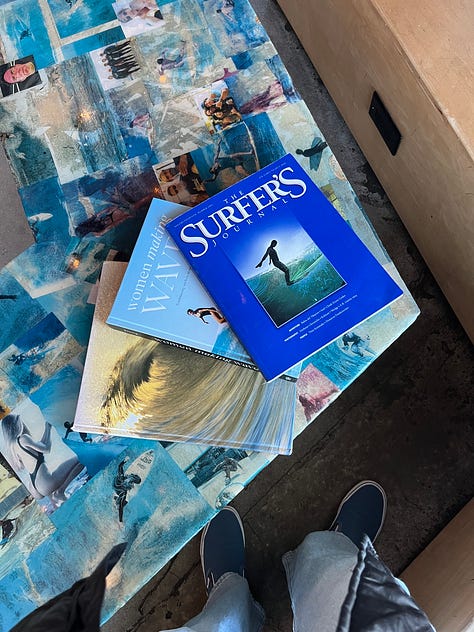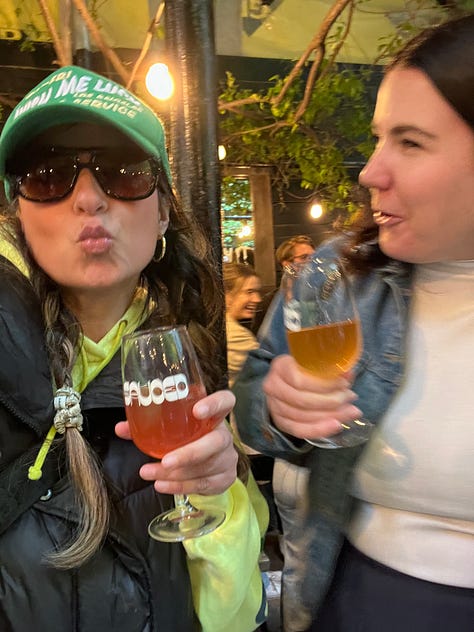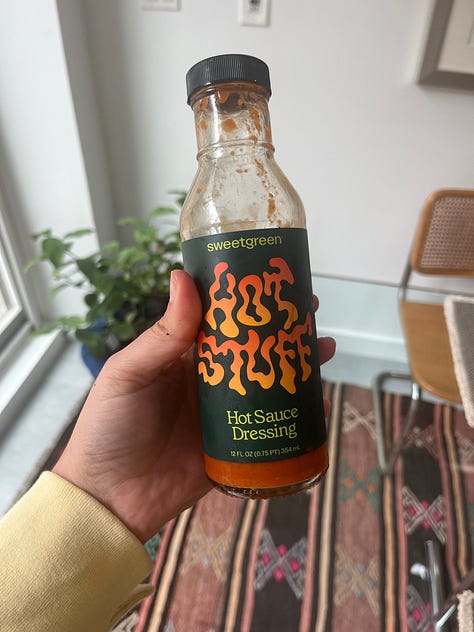They don't build statues of curators.
Curation will never save you. Curation is not a viable business model, job, or meaningful contribution to the universe.
Good morning on this very Spring-y Wednesday and Happy May! My boyfriend and I have dubbed this “8,000-step-a-day-May” and our goal is to surpass 8K steps every day this month.



This is a very meaty letter, so we’ll keep it short up here with the fluff. Here are a few things I’m thinking about— or that I’d love your thoughts on:
Any run clubs or movement oriented meetups that you guys love? (I’m envisioning old “Doing Things” era Outdoor Voices.) I would love to plug into some more existing community run clubs, hike clubs, etc, and give some Prima for sore & tired muscles away to the folks who participate. If you have ones you love, or brands, if you want to join me in this, shoot me a note at zoe@prima.co.
Last night I was making a spring veggie hash for dinner and I found a living lady bug on one of the leaves of spinach. My boyfriend took it to the yard and nestled it in some of the plants so the baby ladybug can live to see another day. 🥰
I’m sorry to tell you this but the Sweetgreen DTC hot sauce dressing is actually really phenomenal. Bought less than a week ago, bottle is already near empty. You can buy it at a Sweetgreen, I have nowhere to link you to check it out because Foxtrot is bankrupt. (Wonder if having Foxtrot skip out on payables was Sweetgreen’s first authentic taste of what it’s like to actually be a DTC brand…)
Do you guys remember a month or so ago when I shared my newsletter of mini biz ideas? Someone has created one of them: “affiliate for regular people”! I’m really curious to see how it goes, I think it is a STEEP challenge to 1.) educate and 2.) reach your target customer.
Alright, *rubs hands together*, let’s get into this. Long-requested, long-procrastinated, juicy, juicy topic.
The best thing I ever tweeted was this:
I’ve had plenty to say about curation since I tried to turn it into a business model in 2020. My hands have been tied— running a curated marketplace, working at a product discovery platform that curated consumer brands— but every day my anti-curation-life force grows stronger and I grow braver. Also, now I can hide behind a pay-gate. Huzzah! Today I’ll tell you what I really think!
If you’re new here, I’m a decade into monetizing curation as a career: first at Food52, then as the founder of my own curated marketplace, Goldune, and then at Thingtesting, a curated product discovery & review platform for consumer brands. I’ve approached it from a bunch of different angles at this point— in up markets and down markets— and I can tell you emphatically that I really hate the word curation, and I don’t believe in it as a business model or differentiator in the year of our Lord 2024. 🙅♀️ Surprise!
I’ll explain. 🙂
Dropshipping, aggregating, or “curating” as the brand strategists (derogatory) would like me to say— is not a value add to the universe. Pulling together other people’s IP and handicrafts and charging them and/or customers for that privilege is not a noble pursuit. It’s not! It’s just not.
Making your own stuff? Bringing together people in real life? Serving a local community? These are wins— and this is why I’ll never have any critique for small business owners who operate in-real-life and not as online dropshippers, Substack listicle writers or TikTok talking heads.
There are a few different flavors of “curation” as a business model: content creation, dropshipping/marketplaces, and “platform” or tech enabled curation. I will mostly be focusing on marketplaces, but you could get me started on all 3 and I’m happy to discuss more in the comments.
Dropshipping1 is inherently easy to get set up doing, there’s not enough barrier to entry and there are many, many people who think they have good taste and can just get started curating. What I think dropshippers and curators and marketplace owners all miss is that when you are in the business of curating, since you are not supplying the product or the IP, you are in the business of providing scale to the partners whose work you are showcasing. It is your job— your only job— to put up massive traffic numbers, or else you have no value or reason to exist. If you cannot keep up your end of the bargain, you will go out of business. There is literally no other reason or value in curation for your partners— you must bring them traffic in order for them to see any value in giving you a cut of sales.
This might not have always been true, it’s possible that in a pre-internet era, curation was a defensible business model, or at least certainly more than it is now. I haven’t spent much of my life pre-ecommerce-boom with disposable income, so I can’t really confirm or deny here— I suspect it was always a traffic and numbers game, in some sense, that’s just how unit economics work in retail.
Traffic means different things to different people, but people with actual scale are few and far between. Food52 had the kind of scale that added value back when I was there in the 2010s. Zola, the bridal marketplace, has the kind of scale that adds value. Goop has meaningful scale.
What do all these successes have in common? They all started out by growing an audience by adding value for their target demographic— then they layered on monetization of their curation, or in other words, a shop. As far as I know, nobody has been successful starting a curated marketplace, discovery platform2, coupon/deal aggregator site (Gilt, etc3) or a curation business without the audience first. (If I’m wrong, correct me in the comments.)
The graveyard of businesses, many of whom raised venture capital, that built their model around curation first:





